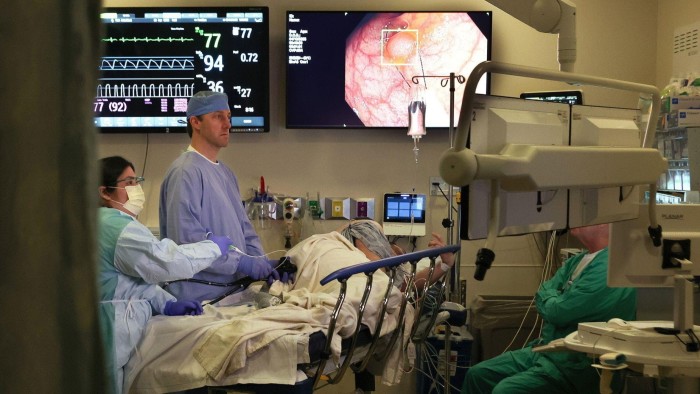Stay informed with free updates
Simply sign up to the Artificial intelligence myFT Digest — delivered directly to your inbox.
The skill of health professionals performing colonoscopies was significantly undermined by having routine assistance from artificial intelligence, a study of 1,400 patients in Poland has found.
The rate at which endoscopists detected precancerous growths in the colon without help from AI fell from 28.4 per cent to 22.4 per cent after their hospitals introduced AI assistance, according to the study published on Tuesday in The Lancet Gastroenterology & Hepatology. The detection rate in AI-assisted colonoscopies was 25.3 per cent.
“Our results are concerning, given that the adoption of AI in medicine is rapidly spreading,” said Marcin Romańczyk of the Academy of Silesia, one of the researchers. “To our knowledge this is the first study to suggest a negative impact of regular AI use on healthcare professionals’ ability to complete a patient-relevant task in medicine.”
AI highlights potentially precancerous tissue — adenomas or polyps — in the colon of patients undergoing endoscopy. It is one of the fastest growing medical applications of AI, with enthusiasm for the technology driven by several clinical trials showing that AI assistance substantially improved detection rates.
Yuichi Mori of the University of Oslo, a co-author of the Polish study, said it called into question the findings of earlier trials that compared colonoscopy with and without AI assistance, “as the endoscopists may have been negatively affected by continuous AI exposure”.
Omer Ahmad, consultant gastroenterologist at University College Hospital, London who was not involved in the study, called the results “astounding”. He said other research had shown a 1 per cent increase in colonoscopy detection rate correlated with a 3 per cent reduction in colorectal cancer, “so a decline in detection from 28.4 to 22.4 per cent could be very significant on a population level”.
Ahmad, who has worked on medical AI systems for eight years, said: “I am still enthusiastic about AI and I’ve seen great benefits in my own practice but the endoscopy community would be unwise to ignore the key findings of this study. We must be more mindful about implementation in real world practice.”
Recommended
The authors acknowledged limitations in the study, which was observational rather than a randomised controlled trial. In particular they called for “more behavioural research to understand the currently under-investigated mechanisms of how AI affects physician capability.”
How the detecting skills of experienced endoscopists could degrade within a few months of using AI needs urgent investigation, said Ahmad. A previous eye-tracking study showed that working with a computer-aided diagnostic system led users to change their “gaze patterns” and spend less time looking at the periphery of the screen.
In response, professional societies could mandate periods of non-AI work to bolster human skills. Maintaining core competencies would be essential as AI was adopted more widely, “to protect against over-dependence on AI algorithms that can be subject to performance drift,” Ahmad said. “Human judgment will need to be available when AI outputs are uncertain or incorrect.”


